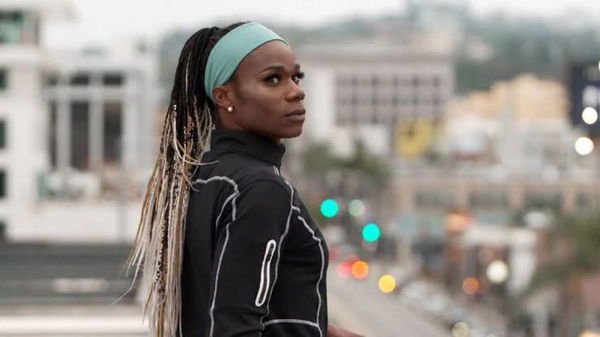

“Track has been the one consistent thing in my life that has saved me,” CeCé Telfer said. “It’s the only thing that’s made me feel free.” This is said by the same track and field athlete who made history in 2019 as the first openly transgender woman to win an NCAA title in the 400-meter hurdles, but her path in sports has been met with barriers. First, she was ruled ineligible for the 2021 Olympic Trials due to hormone regulations. Then, in 2023, just two days before she was set to compete again, World Athletics effectively banned trans women from female categories, shattering her Paris 2024 dreams. But…2025?
Now, in 2025, those barriers have only grown. Donald Trump’s return to office brought the “Keeping Men Out of Women’s Sports” executive order, further restricting trans athletes and crushing any hope of Telfer competing in the 2028 LA Olympics. But for Telfer, it’s yet another roadblock in a fight she refuses to give up. And yet, not everyone sees it that way. Amanda Davies! Yes, that Amanda Davies—who wasted no time sitting down with Telfer for a headline-making interview. There, Telfer didn’t hold back, revealing how her “identity is a target, especially in America.”
ADVERTISEMENT
Article continues below this ad
Amanda Davies sparks a conversation with CeCe Telfer
Amanda Davies, the CNN International sports presenter, recently stirred things up on February 18 by tagging CeCé Telfer in an Instagram reel. With Telfer unable to compete in female world-ranking events due to current regulations, her track and field Olympic dreams are stuck in limbo. But if you think she’s backing down, think again. In her interview, she made it clear she’s ready to have some tough conversations—“I am willing to sit down with the IOC, the USATF, the NCAA, with any of my international federations—even the Trump administration. Trump himself, if he wants to sit down with me and talk, and have a human conversation and see me.” Bold move, right?
View this post on Instagram
ADVERTISEMENT
Article continues below this ad
Davies, never one to shy away, pushed further: “What would you say to President Trump? What would your message be?” Telfer didn’t sugarcoat it: “I need some explanation as to why you want to completely eradicate us from society when we’ve done nothing wrong. And like, even if he wants to have a team follow me around and see my day-to-day life as a transgender female athlete—I’m all for it.” Imagine that reality show. Then Davies hit her with the big one.
“Has life changed since Trump’s inauguration?” Telfer’s response was brutally honest: “Oh my gosh. I’m Black, I’m a woman, I’m transgender, and I’m an athlete—each of my identities is a target, especially in America. Before this administration, I woke up every day facing adversity. Now? I wake up and have to make sure I make it home alive. It’s really sad to see people going out of their way to make it known that you don’t belong here.” No filter, no fluff—just the reality of what it means to exist in a space that keeps trying to push you out. And she’s not alone. Other transgender track and field athletes face the same battle, fighting for the right to compete, exist, and be seen.
What’s your perspective on:
Are trans athletes like CeCé Telfer being unfairly targeted, or is it about maintaining fair competition?
Have an interesting take?
ADVERTISEMENT
Article continues below this ad
The reality of trans participation in track and field
Olympian and track and field star Nikki Hiltz made waves before competing at the Millrose Games. Just days before stepping onto the track, Hiltz took to social media to call out the growing attacks on trans athletes, turning what was supposed to be just another race into a statement of defiance. On February 8, they competed in the prestigious Wanamaker Mile, finishing third in a razor-close race behind Georgia Bell and Heather MacLean. But while the race was thrilling, the real headline was Hiltz’s bold stance against policies restricting trans participation in sports.
Following the race, Hiltz didn’t hold back when asked about the impact of these policies, particularly Trump’s executive order banning trans women from competing in female sports. They spoke about the overwhelming challenges trans athletes face, calling the daily attacks exhausting and unnecessary. Highlighting that fewer than 10 trans athletes compete among 500,000 in the NCAA, they argued that this issue is being blown out of proportion. Through their track and field performances and advocacy, Hiltz continues to push for a future where sports are about competition—not exclusion.
ADVERTISEMENT
ADVERTISEMENT
ADVERTISEMENT
ADVERTISEMENT


Are trans athletes like CeCé Telfer being unfairly targeted, or is it about maintaining fair competition?